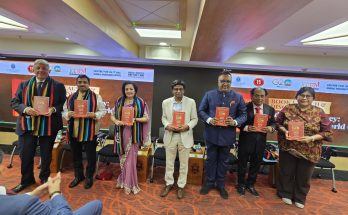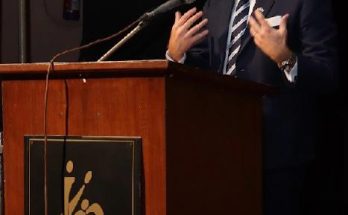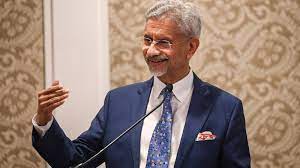
Myanmar’s embrace of democratic reforms over the last two years has opened up new possibilities for India to deepen its multi-faceted engagement with the Southeast Asian country, says Rajiv Bhatia, the Director-General of the Indian Council of World Affairs (ICWA), India’s preeminent think tank.
Bhatia, a former ambassador of India to Myanmar, recently led a delegation of experts from India to the resource-rich modernising Southeast Asian country, the first track II dialogue between the two sides. The delegation, among others, comprised Shyam Saran, a former foreign secretary and a former ambassador to Myanmar, and scholars from five leading think tanks in India.
In this conversation with Manish Chand at his office in Sapru House, the iconic building that houses the ICWA, Bhatia shares his insights into the path-breaking transformation process in Myanmar and its ramifications for Indian diplomacy. Bhatia is convinced that it’s “a rare opportunity” for India and Indian businesses to scale up their engagement with Myanmar. It’s time to take risks, and rewards will follow, he says.
(Excerpts from the interview)
Q) You led a multi-think tank delegation from India to Myanmar recently. What was the idea behind this initiative and how successful was this exercise?
A) It was a historic visit in so far as it was the first structured exchange of views between experts and foreign policy intellectuals of both countries. The wide-ranging interactions gave us rare insights into politics and foreign policy priorities of Myanmar. It enabled both sides to examine political, foreign policy and economic aspects of bilateral relations and discuss ways to take relations forward in all these areas. The visit of the ICWA-sponsored delegation underlined the commitment of India’s leading Track II institutions to further study, research, and disseminate accurate knowledge about ‘the new Myanmar’ in the backdrop of historic internal developments as well as important recent trends in the bilateral, regional and international context. The initiative also reflected a new bond of cooperation between the Myanmar Institute of Strategic and International Studies (MISIS) and the Indian Council of World Affairs (ICWA), which flowed from the MoU that they signed during the Indian Prime Minister’s visit to Myanmar in May 2012. It was an important step in the quest for deeper understanding and stronger friendship between Myanmar and India.
Q) There are conflicting appraisals of the reforms initiated by the new government in Myanmar? How real are these reforms?
A) Myanmar has been changing substantially due to the reform strategy adopted by the new government: reforms in political, economic and strategic areas. These reforms have made considerable progress, more than what one could have imagined a couple of years ago. You can see the change everywhere: more freedom, more ideas to play around with, traffic jams, more visitors and delegations from abroad.
In the past two years, the Myanmar government’s reform caravan has indeed performed an impressive journey. Many important steps have been taken, including operationalisation, after November 2010 elections, of the new Parliament and other democratic institutions established under the 2008 Constitution; release of political prisoners and normalisation of political life; and granting of a variety of freedoms to labour, media and civil society. Also, the government there has embarked on an ambitious programme of economic liberalisation and development. The country’s political and socio-economic landscape has changed substantially. And, what’s more, recognition of this change by Myanmar’s international partners has been swift, substantial and somewhat competitive in nature.
The change is happening, but at the same time the challenges are also formidable. The ethnic problem continues to fester. For these ambitious reforms to succeed, the political elite would have to maintain a consensus on basic issues; otherwise, it will be difficult to sustain the momentum and secure the national goal of accelerated economic growth.
Q) What are the implications of the new reforms in Myanmar for the India-Myanmar relations?
A) The change in Myanmar has paved the way for better and stronger relations between India and Myanmar.
Political reforms have opened up more possibilities for India-Myanmar engagement. Clearly the change in Myanmar, flowing from the emergence of a new national consensus and reconciliation, has had beneficial impact on India- Myanmar relations. The high point of our visit to Myanmar was the nearly one-hour long meeting with iconic pro-democracy leader Daw Aung San Suu Kyi.
Q) What are these new areas India should be focusing on?
A) The change has opened new avenues. There are many promising areas: we are sharing our expertise in parliamentary democracy. Much is going on in terms of training of the MPs from Myanmar. Most government positions in Myanmar are still manned by former military officers. Against this backdrop, Indian can assist Myanmar in democratic institution building. In terms of capacity building, India is planning to set up an IIT-like institute in Myanmar. Connectivity, physical as well as digital, is going to be another important area of win-win cooperation.
Q) What’s your assessment of the business climate in Myanmar? What new opportunities are there for Indian companies?
A) There are three types of investors coming to Myanmar. There are American and Western companies, but their investment plans are mostly in an exploratory stage. Then, there are companies from Southeast Asian countries like Japan, South Korea and Thailand which are already in a business mode. As far as India is concerned, there are some sections of India Inc. who are quite enthusiastic about investing in Myanmar. There are some who are indifferent and some have reservations about the viability of investing in that country. My assessment is that it’s a rare opportunity we have in Myanmar. We must learn to emulate other Asian countries and step up investment in Myanmar. It’s time to take risks; rewards will follow.
Q) Is there a new great game unfolding in this new Myanmar? China has massive investments in Myanmar and has close links with the military establishment. Do you see the potential for rivalry between India and China in Myanmar?
A) The Myanmarese side has expressed apprehensions that Myanmar may become a staging ground for rivalry between India and China. We presented an alternative scenario and made it clear that we don’t want rivalry with China. We will engage with Myanmar on our own merit. There is enough room for both India and Myanmar to do business in Myanmar. This is yet another reason why Indian businesses must step up investment in Myanmar and help provide a balance of sorts in Myanmar.
Author Profile

- Manish Chand is Founder-CEO and Editor-in-Chief of India Writes Network (www.indiawrites.org) and India and World, a pioneering magazine focused on international affairs. He is CEO/Director of TGII Media Private Limited, an India-based media, publishing, research and consultancy company.
Latest entries
 India and the WorldMarch 3, 2024India-Denmark Connect: Red carpet for Indians to Red Sea cooperation
India and the WorldMarch 3, 2024India-Denmark Connect: Red carpet for Indians to Red Sea cooperation India and the WorldFebruary 17, 2024Munich Security Conference: Jaishankar, Blinken focus on Red Sea, Middle East
India and the WorldFebruary 17, 2024Munich Security Conference: Jaishankar, Blinken focus on Red Sea, Middle East India and the WorldFebruary 14, 2024Munich Security Conference report: Migration, war top security threats
India and the WorldFebruary 14, 2024Munich Security Conference report: Migration, war top security threats India and the WorldJanuary 23, 2024With “Ram to Rashtra” mantra, Modi consecrates Ram temple for national renewal
India and the WorldJanuary 23, 2024With “Ram to Rashtra” mantra, Modi consecrates Ram temple for national renewal







